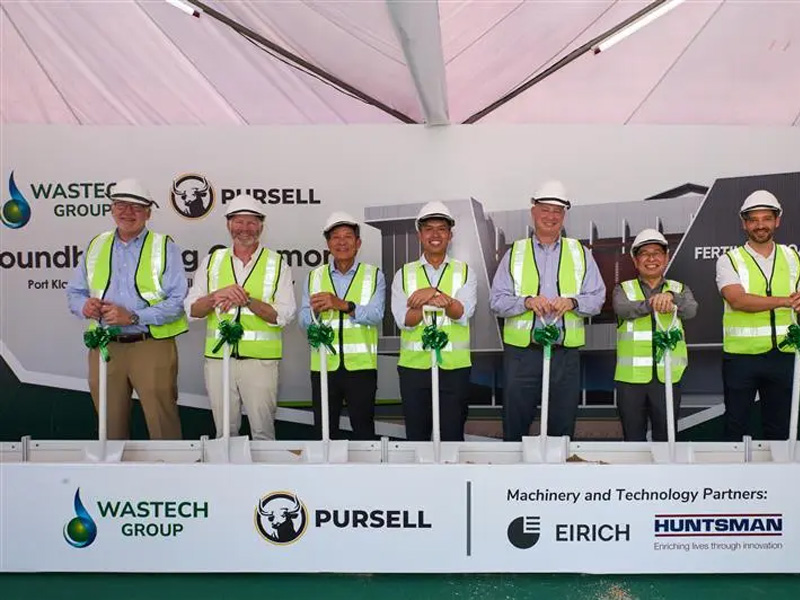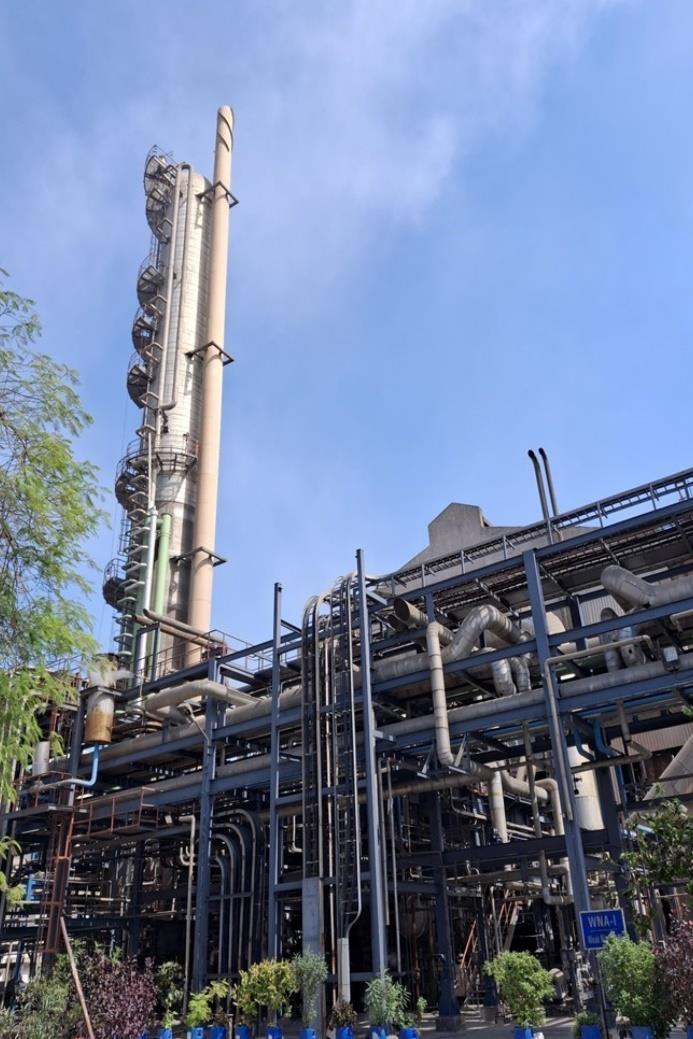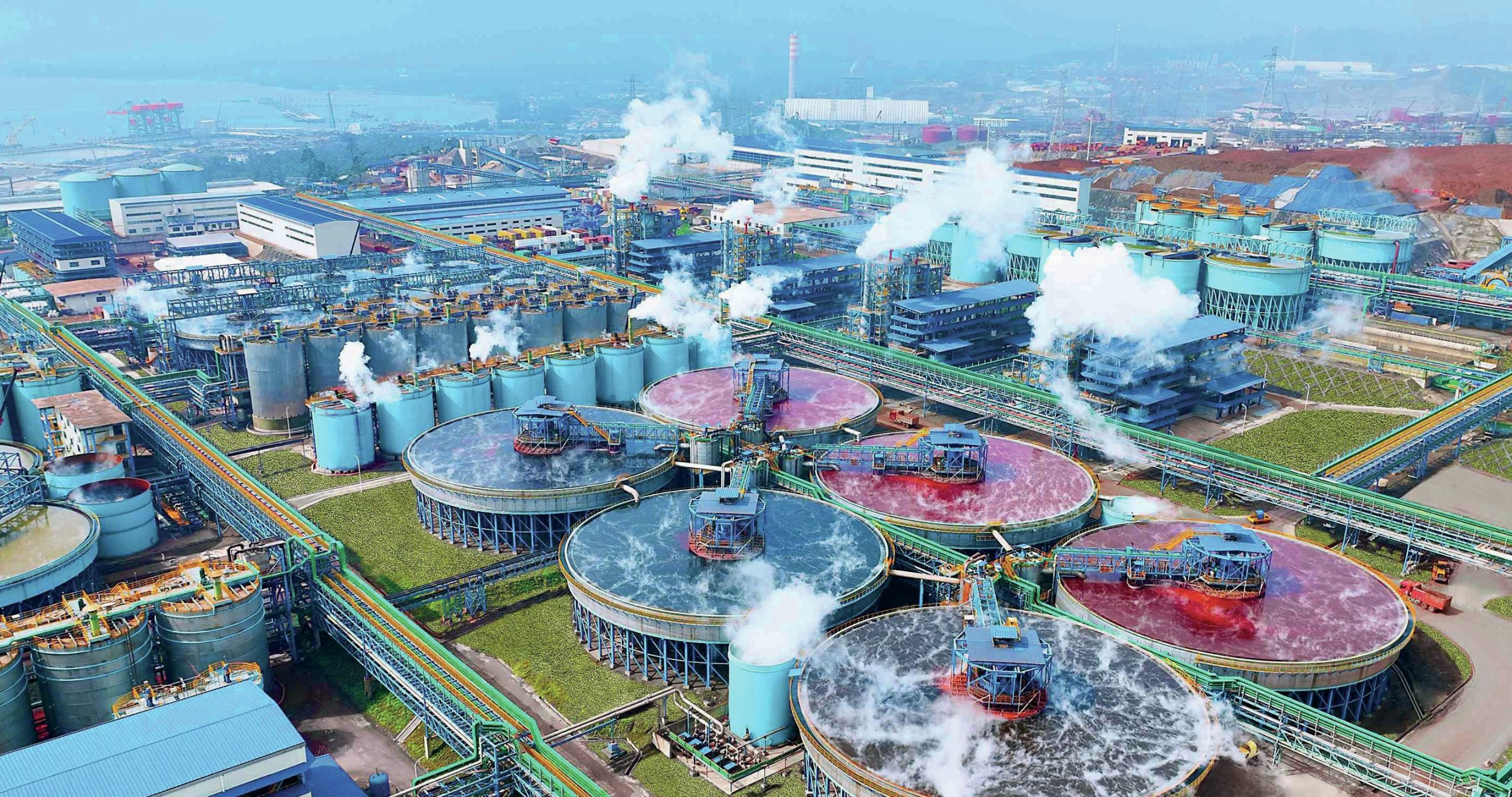Nitrogen+Syngas 367 Sept-Oct 2020
30 September 2020
Syngas News Roundup
Syngas News
CHINA
Matthey to supply technology for world’s largest single train methanol plant
Johnson Matthey (JM) has been selected by China’s Ningxia Baofeng Energy Group as licensor for a third methanol synthesis plant at their coal to olefins complex near Yinchuan in Ningxia province. With a planned capacity of 7,200 t/d (2.4 million t/a), the unit will be the largest single train methanol plant in the world once completed.
Under the terms of the agreement, Johnson Matthey will be the licensor and supplier of associated engineering, technical review, commissioning assistance, catalyst and equipment supply. The methanol plant will take synthesis gas as a feed and utilise JM radial steam raising converters in a patented series loop to produce methanol for downstream olefins production. The plant will provide enhanced energy efficiency along with low opex, capex and emissions.
This is JM’s 8th operating license in China and the third JM design licensed by Ningxia Baofeng Energy, following the recent successful commissioning of the 6,600 t/d Baofeng methanol synthesis unit in May 2020 and the original 4,450 t/d methanol synthesis unit, commissioned in 2014. Ningxia Baofeng Energy, founded in 2005, is the largest private coal to olefins producer in China. Its Ningdong chemical complex now produces 4 million t/a of methanol and 1.2 million t/a of polyolefins.
“We are very proud of our ongoing collaboration with Ningxia Baofeng Energy. It is testament to their confidence in JM’s engineering expertise and ability to successfully design and help deliver their large-scale methanol plants”, said John Gordon, Managing Director for Johnson Matthey. “In just over six years it has been exciting to see our strong partnership result in the commissioning of two large scale plants with increasing volumes and a third world-scale plant on the way. We are very much looking forward to this next ambitious phase of our journey and continuing to raise the bar of world-class project delivery.”
ITALY
Agreement on ‘syngas fermentation’ technology
NextChem, Maire Tecnimont’s subsidiary for ‘Green Chemistry and Energy Transition’ technologies, has signed an agreement with US-based LanzaTech to license the latter’s ‘Waste to Ethanol’ process, expanding NextChem’s technology portfolio in ‘circular economy’ and chemical recycling technologies, which currently include ‘circular’ hydrogen and methanol production technologies, based on the chemical recycling of plastic and dry waste via gasification. LanzaTech’s adds a biological “syngas fermentation” technology, in which ethanol is produced by bacteria which operate on CO-rich feeds, transforming the syngas at low temperatures and pressure, improving the overall sustainability profile of the process. NextChem will exclusively license this technology in Italy and, on a project basis, in some foreign markets.
NextChem says that technological integration the most important aspect of the circular economy sector, as it allows the production of chemical building blocks such as hydrogen, methanol, ethanol from currently non-recyclable waste, avoiding fossil sources and reducing climate-changing emissions while increasing the share of recycling.
“We are expanding our technology portfolio from a strategic perspective: our circular district model and our waste-to-chemicals technology platform are the answers both to the problem of reliance on foreign supplies of chemical products, and to the problem of recovery of currently non-recyclable waste fractions, and to the problem of decarbonisation”, said Pierroberto Folgiero, CEO of NextChem and Maire Tecnimont. “NextChem aims to provide the market with technological solutions to completely replace traditional fossil-based chemistry with biochemistry and waste chemistry. We want to re-build coal chemistry, excluding coal entirely: an extremely ambitious goal, which today has become possible”.
NextChem has also recently signed an agreement with Eni to build three waste gasification plants in Italy, to produce hydrogen, at Porto Marghera near Venice, a methanol plant at Livorno, and a syngas plant for Eni’s Taranto refinery to generate hydrogen for desulphurisation as well as carbon monoxide for direct iron reduction at the nearby steel mill.
GERMANY
Partnership for GTL technology commercialisation
Clariant has entered into a partnership with joined forces with Ineratec, a spinoff of the Karlsruhe Institute of Technology (KIT), to develop and commercialise novel technologies for the production of renewable fuels and chemicals. Clariant will provide its catalysis expertise and broad portfolio of syngas conditioning and upgrading catalysts to support Ineratec’s novel gas-to-liquids (GTL) technology.
Stefan Heuser, senior vice president and general manager at Clariant Catalysts, said: “We are honoured to support Ineratec in their pioneering work in sustainable fuel production. Their state-of-the-art, container-sized gas-to-liquid technology has great potential for the decentralized fuel market, and we are excited to contribute with our tailor-made syngas catalyst innovations.”
Ineratec’s process is a modular, containerised GTL technology which combines hydrogen, potentially generated from renewable power, with greenhouse gases such as CO2 to form CO2 -neutral synthetic hydrocarbons and fuels. It uses reactors with a micro-structured core to provide a large surface area for heat and mass transfer, allowing highly exothermic reactions in a compact volume, with high conversion per reactor pass.
Hydrogen for electricity grid stabilisation
Thyssenkrupp’s proprietary water electrolysis technology has been accepted by E.On for participation in Germany’s primary control reserve market. This means that thyssenkrupp’s electrolysis plants will be able to act as large-scale buffers to stabilise the power grid and compensate fluctuations quickly and flexibly. Operators can now link their plants to the German electricity market via E.On’s virtual power plant.
thyssenkrupp and E.On tested the technology at an existing water electrolysis plant operating as part of the Carbon2Chem® project in Duisburg. It was shown that thyssenkrupp’s electrolysers can increase and decrease their production at the speed required to participate in the premium primary reserve market, including being able to provide full supply within 30 seconds and maintain it for at least 15 minutes. The electrolysis provides green hydrogen that can be stored for hours, days or months before being converted back into electricity or used as a clean, CO2 -free starting material in the mobility sector or for the production of sustainable chemicals.
UNITED STATES
Agreement for world-scale hydrogen plants
Air Products has signed a strategic cooperation agreement with thyssenkrupp Uhde Chlorine Engineers, under which the two companies will collaborate exclusively in key regions, using their complementary technology, engineering and project execution strengths to develop projects supplying green hydrogen.
thyssenkrupp will deliver its technology and supply specific engineering, equipment and technical services for water electrolysis plants to be built, owned and operated by Air Products, supporting Air Products’ development of green hydrogen as an energy carrier for sustainable transportation, chemicals and power generation.
“The SCA with thyssenkrupp is an important element of our value chain in developing, building, owning and operating world-scale projects and supplying green hydrogen for mobility, energy and industrial applications. We look forward to applying our complementary strengths and delivering substantial sustainability benefits through transformational green hydrogen projects,” said Dr. Samir J. Serhan, Chief Operating Officer at Air Products.
“We are proud to cooperate with Air Products in making value chains for fuels, chemicals, and industry feedstocks sustainable. Large-scale electrolysis is the key technology to connect renewable power to the different sectors of mobility and industry. As a world market leader in electrolysis we bring in both: technology and production capacity at scale. Already today, we are set to supply one gigawatt for water electrolysis plants per year, and we are prepared to ramp up the capacity in this rapidly evolving market,” said Denis Krude, CEO at thyssenkrupp Uhde Chlorine Engineers.
MALAYSIA
Samsung wins contract for Sarawak methanol plant
Samsung Engineering says it has received a $55.5 million contract from Sarawak PetChem to conduct early works on the second phase of Sarawak’s planned methanol facility in Malaysia. The move is seen as a likely precursor to Samsung being awarded the full $1 billion EPC contract for the project. The 5,000 t/d methanol project, to be built in Bintulu, will be based on Air Liquide E&C’s Lurgi MegaMethanol technology. Operations are planned to begin in 2023. Samsung and Air Liquide E&C jointly carried out the front-end engineering design (FEED) study for the project in April 2019.
AUSTRALIA
BHP to recycle tyres via waste gasification
BHP is partnering with Novum Energy in a project to recycle truck tyres from its facilities in Queensland. Novum will take used earth moving tyres from all seven BHP Mitsubishi Alliance (BMA) and BHP Mitsui Coal (BMC) sites in Queensland and convert them into heavy and light oils, carbon black, syngas and steel at a processing plant which is being built in Nebo within the Isaac region. The company is aiming to process 19,000 t/a of rubber to produce about nine million litres of fuel oil, according to Novum managing director Rowan Kendall.
BMA asset president James Palmer said that the tyre recycling program would not only create up to 30 jobs in the Bowen Basin but also reduce emissions across the company’s operations. “We are constantly looking for ways to increase the sustainability of our operations, reduce emissions and contribute to regional communities and this new BHP-led initiative does just that,” Palmer said. “New technology means rather than storing old tyres, which weigh around 4.9 tonnes each, they can now be recycled and turned into new products. This helps us create a circular economy in the region by repurposing waste locally and creating activity in the region.”
DENMARK
Topsoe joins sustainable fuel project
Haldor Topsoe has joined a consortium of Danish companies to develop a hydrogen and sustainable fuel facility based on electrolysis in the greater Copenhagen area.
The project is expected to be executed by 2030 in three stages, achieving a capacity of 10 megawatts (MW) of electrolysis capacity in 2023, 250 MW in 2027, and 1.3 GW by 2030. With the large-scale supply of renewable electricity needed, the timing of phases two and three will depend on the execution of the offshore wind power project off the island of Bornholm in Denmark.






